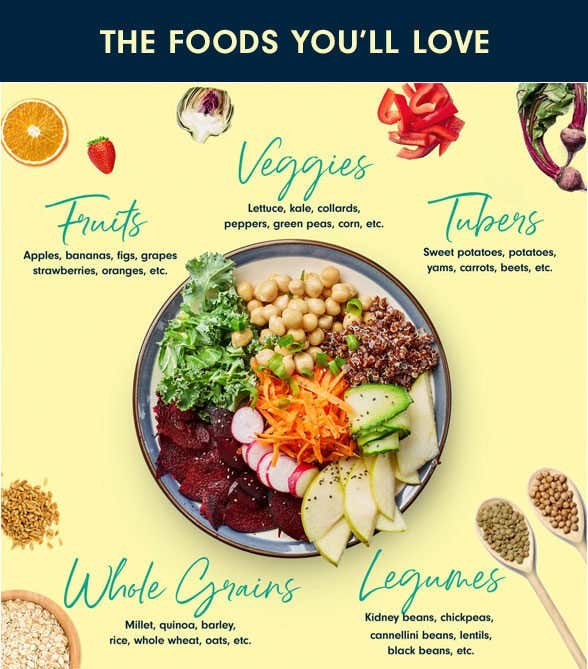The Ultimate Sugar Free Sauces Taste Test: Which One Wins?
The Ultimate Sugar Free Sauces Taste Test: Which One Wins?
Blog Article
Everything About Healthy And Balanced Food: Benefits of Checking Out Plant Based Alternatives
The conversation surrounding plant-based diets has obtained substantial focus in recent times. Several people are checking out the potential wellness advantages, dietary benefits, and ecological impacts related to these nutritional selections. As individuals end up being a lot more knowledgeable about their food's impact on wellness and sustainability, concerns emerge concerning the functionalities of embracing such a way of living. What specific adjustments can one anticipate, and exactly how might these selections improve not just individual wellness yet also the planet's future?
Understanding Plant-Based Diet Plans
Numerous people link plant-based diets mostly with vegetarianism or veganism, these diets can incorporate a large array of eating patterns that focus on entire, minimally processed plant foods. Such diet plans typically include fruits, veggies, entire grains, vegetables, seeds, and nuts, while removing or limiting animal products. This flexibility permits individuals to customize their dietary selections according to nutritional demands and individual preferences. Some might adopt a primarily plant-based diet regimen while still occasionally consuming meat or milk, typically described as a flexitarian method. The emphasis remains on integrating even more plant foods, which can bring about a varied array of tastes and dishes. Understanding these different analyses of plant-based consuming is essential for valuing its access and appeal in contemporary food culture.
Wellness Conveniences of Plant-Based Foods
The health benefits of plant-based foods are significant, providing a nutrient thickness benefit that sustains total health. Study indicates that these foods can improve heart health and play a crucial role in effective weight management. By incorporating much more plant-based choices, individuals may boost their nutritional options and advertise long-lasting health and wellness.
Nutrient Density Advantage
Nutrient density plays an important function in the health benefits of plant-based foods, making them a compelling selection for those looking for a well balanced diet plan. Plant-based foods, such as fruits, vegetables, legumes, nuts, and whole grains, are frequently rich in essential vitamins, minerals, and anti-oxidants while being reduced in calories. This high nutrient thickness enables individuals to consume less calories while still satisfying their nutritional needs. Additionally, these foods are loaded with dietary fiber, promoting digestive wellness and helping in weight administration. By incorporating nutrient-dense plant-based alternatives, customers can improve their overall health, support their immune systems, and decrease the danger of chronic conditions. Eventually, the nutrient density of plant-based foods emphasizes their relevance in a health-conscious way of life.
Heart Health Renovation

Weight Administration Support
Along with promoting heart health and wellness, a plant-based diet can substantially help in weight management. This nutritional approach stresses whole foods such as fruits, veggies, beans, nuts, and whole grains, which are normally reduced in calories and higher in fiber compared to animal-based products. The high fiber web content assists enhance satiety, decreasing total calorie intake. Plant-based diets are typically rich in important nutrients while reduced in undesirable fats, making it much easier to preserve a healthy weight. Research study shows that individuals who adopt a plant-based way of living tend to have lower body mass indexes (BMIs) and experience even more effective weight loss compared to those that eat meat-heavy diets. Accepting plant-based options is a calculated selection for effective weight monitoring.
Nutritional Value of Plant-Based Active Ingredients
Plant-based ingredients are rich in vital nutrients, using a varied array of vitamins, minerals, and antioxidants that add to overall health. A contrast of healthy protein sources exposes that while animal items are usually viewed as superior, many plant-based choices offer appropriate healthy protein and other helpful substances. Understanding the nutritional worth of these active ingredients can aid people make educated dietary choices.
Essential Nutrients in Plants
Nutrient-rich ingredients discovered in plants use a diverse range of crucial nutrients that add greatly to general health and wellness. These components are rich in vitamins A, C, and K, which sustain immune feature, vision, and blood clotting, specifically. On top of that, plants supply essential minerals such as potassium, magnesium, and calcium, important for heart health, muscular tissue feature, and bone strength. The presence of fiber in plant-based foods aids food digestion and promotes a healthy and balanced digestive tract microbiome. Antioxidants, found perfectly in vegetables and fruits, help fight oxidative tension and reduce swelling. Several plant foods are low in calories yet high in nutrients, making them an outstanding selection for those seeking to preserve a healthy and balanced weight while ensuring suitable nutrient intake.

Contrasting Healthy Protein Resources
Protein sources vary substantially in their nutritional profiles, with plant-based ingredients using special advantages. Unlike animal healthy proteins, which often include he said saturated fats and cholesterol, plant healthy proteins have a tendency to be lower in these undesirable elements. Legumes, nuts, seeds, and whole grains are rich in crucial amino acids, fiber, vitamins, and minerals. Lentils supply high protein web content along with considerable iron and folate, while quinoa is a full healthy protein, offering all 9 crucial amino acids. Furthermore, plant-based proteins are commonly gone along with by anti-oxidants and phytochemicals that sustain overall wellness. The shift to plant-based healthy protein sources not just improves dietary intake yet likewise aligns with sustainable nutritional methods, reducing environmental influence and advertising long-term wellness advantages.
Ecological Impact of Plant-Based Eating
As understanding of climate change expands, several individuals are exploring sustainable nutritional options that can greatly minimize their ecological impact. Plant-based consuming has actually arised as a significant factor to minimizing greenhouse gas exhausts, which are mainly connected with animals production. The farming of fruits, veggies, vegetables, and grains commonly calls for fewer resources, such as water and land, compared to pet farming. In addition, plant-based diets can lead to reduced logging, as much less land is required for grazing livestock or growing animal feed. By moving towards plant-based choices, customers can sustain biodiversity and advertise much healthier environments. Overall, welcoming plant-based consuming not just advantages personal wellness but additionally represents an essential action toward environmental sustainability and preservation initiatives.
Overcoming Common Misconceptions
While many individuals recognize the advantages of a plant-based diet plan, numerous mistaken beliefs often hinder them from fully welcoming this lifestyle. A common idea is that plant-based diet plans do not have enough protein; however, many plant sources, such as legumes, nuts, and tofu, give adequate protein. In addition, some think that this diet plan is expensive, when as a matter of fact, staples like beans, rice, and seasonal veggies can be quite inexpensive. One more misconception is that plant-based eating is overly limiting, whereas it really supplies a diverse selection of foods and tastes. Finally, several stress that a plant-based diet may lead to shortages, yet with proper preparation, individuals can get all required nutrients, including nutrients, while enjoying a broad variety of tasty dishes.
Tips for Transitioning to a Plant-Based Lifestyle
Making the shift to a plant-based lifestyle can be an enhancing experience, though it usually needs some advice to navigate the preliminary adjustments. Individuals are encouraged to begin gradually, incorporating more fruits, veggies, legumes, and whole grains right into their meals while lowering meat and dairy products intake. Dish planning is essential; preparing a regular food selection can aid ease the adjustment and stop last-minute undesirable choices. Checking out new dishes and cooking approaches can likewise improve the experience and preserve exhilaration concerning plant-based eating. Additionally, joining assistance teams or neighborhoods can provide inspiration and share beneficial ideas. Remaining educated concerning nourishment assurances well balanced meals, protecting against shortages while cultivating a healthy and balanced, satisfying plant-based way of living.

Delicious Plant-Based Meal Concepts
Exploring delicious plant-based dish ideas can motivate individuals to accept a more nutritious diet. One preferred alternative is a passionate quinoa salad, including cherry tomatoes, cucumber, and a spicy lemon-tahini clothing. One more fave is a mouthwatering lentil stew, loaded with carrots, celery, and fragrant natural herbs, excellent for a calming dinner. For breakfast, over night oats made with almond milk, review chia seeds, and topped with fresh berries provide a healthy begin to the day. Additionally, a vibrant vegetable stir-fry with tofu and a variety of colorful veggies can be a fast yet satisfying dish. Lastly, creamy avocado toast on whole-grain bread, sprayed with seeds and flavors, provides a straightforward yet delicious snack. These meals showcase the range and splendor of plant-based consuming.

Often Asked Concerns
Can a Plant-Based Diet Give Enough Healthy Protein?
The concern of whether a plant-based diet regimen can give sufficient healthy protein is common. Countless sources, consisting of vegetables, nuts, seeds, and whole grains, can fulfill protein requires efficiently, sustaining a healthy and well balanced diet for people.
Are Plant-Based Diet Regimens Ideal for Kid?
The viability of plant-based diet plans for kids relies on cautious preparation. Sufficient nutrients must be guaranteed, consisting of proteins, minerals, and vitamins. With proper support, such diet regimens can support healthy and balanced development and growth in children.
Exactly how Do I Eat in restaurants on a Plant-Based Diet regimen?
Dining out on a plant-based diet involves looking for restaurants with varied menus, requesting alterations, and checking out vegan-friendly alternatives. Preparation in advance and connecting dietary preferences can boost the eating experience while preserving nutritional choices.
What Prevail Allergens in Plant-Based Foods?
Common irritants in plant-based foods consist of soy, gluten, nuts, and seeds - Plant Based Chicken. People complying with a plant-based diet plan should know these irritants and review tags carefully to stay clear of damaging responses and guarantee safe consumption
Can Plant-Based Diets Aid With Fat Burning?
Research suggests that embracing a plant-based diet might help with fat burning due to its usually lower calorie thickness and higher fiber web content. This combination can boost satiety, aiding individuals handle their caloric intake efficiently. Many individuals associate plant-based diet regimens mainly with vegetarianism or veganism, these diet regimens can incorporate a broad variety of consuming patterns that focus on whole, minimally processed plant foods. Nutrient thickness plays a necessary role in the wellness advantages of plant-based foods, making them a compelling choice for those seeking a balanced diet plan. Plant-based diet regimens have been shown to significantly enhance heart wellness, as they usually consist of aspects that support cardio feature. In addition to advertising heart health and wellness, a plant-based diet regimen can substantially assist in weight administration. A typical idea is that plant-based diet he has a good point plans lack sufficient protein; however, countless plant sources, such as legumes, nuts, and tofu, offer ample protein.
Report this page